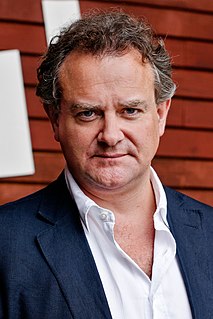A Quote by Melissa Febos
Our lives are a long series of acquiring and then sloughing narratives.
Related Quotes
I think we all are born inside of our parents' narratives. We stay there for a good while. We are taught their narratives about everything: their marriage, the world, God, gender, identity, etcetera. Then, at some point, our own narrative develops too much integrity to live inside that story. We don't ever fully escape it, but we move into our own stories.
We were all expecting to finish [Downton Abbey] after Series 1, actually. And then, it got extended to Series 3, and that's when two of our much loved and much missed friends left. And then, it was going to be done with Series 5, but Julian Fellowes said, "I'd like to do one more." So it's been a series of extensions, rather than wondering how much longer we can go on for.
Every situation has qualities. Essentially, we quantify them and that's the practical side of our lives, so the involvement with perception and in acquiring the perception is our ability to understand qualities. They exist only as long as a human being keeps them in play. They're - Therefore they are akin to energy.
The mind of man can never be wholly barren. Through our whole lives we are subject to successive impressions; for, either new ideas are continually flowing in, or traces of the old ones are marked deeper. If, therefore, you be not acquiring good principles be assured that you are acquiring bad ones; if you be not forming virtuous habits you are, how insensibly soever to yourselves, forming vicious ones.
I chose Congo in order to become close to a place that we had turned away from. It isn't present in our imaginations, in the stories we tell each other. Yet it's relevant to our lives and to our worlds, in a practical way. Congo supplies raw materials for the things that we use on a daily basis. We are intimately linked to Congo, economically. We're linked to it through human events that are occurring there, that affect all of us, and yet you don't find narratives of Congo present in our lives.
I think in America, especially today, our relationship to war is incredible distant. Yet narratives of war have such a primal power in this culture. They mainline directly into a whole series of emotional reactions and understandings of American patriotism, masculinity, and all of these other things.
The rest-the vast majority, tens of thousands of days-are unremarkable, repetitive, even monotonous. We glide through them then instantly forget them. We tend not to think about this arithmetic when we look back on our lives. We remember the handful of Big Days and throw away the rest.
We organize our long, shapeless lives into tidy little stories...But our lives are mostly made up of junk, of ordinary, forgettable days, and 'The End' is never the end.
The significance of our lives and our fragile planet is then determined only by our own wisdom and courage. We are the custodians of life's meaning. We long for a Parent to care for us, to forgive us our errors, to save us from our childish mistakes. But knowledge is preferable to ignorance. Better by far to embrace the hard truth than a reassuring fable. If we crave some cosmic purpose, then let us find ourselves a worthy goal.
































